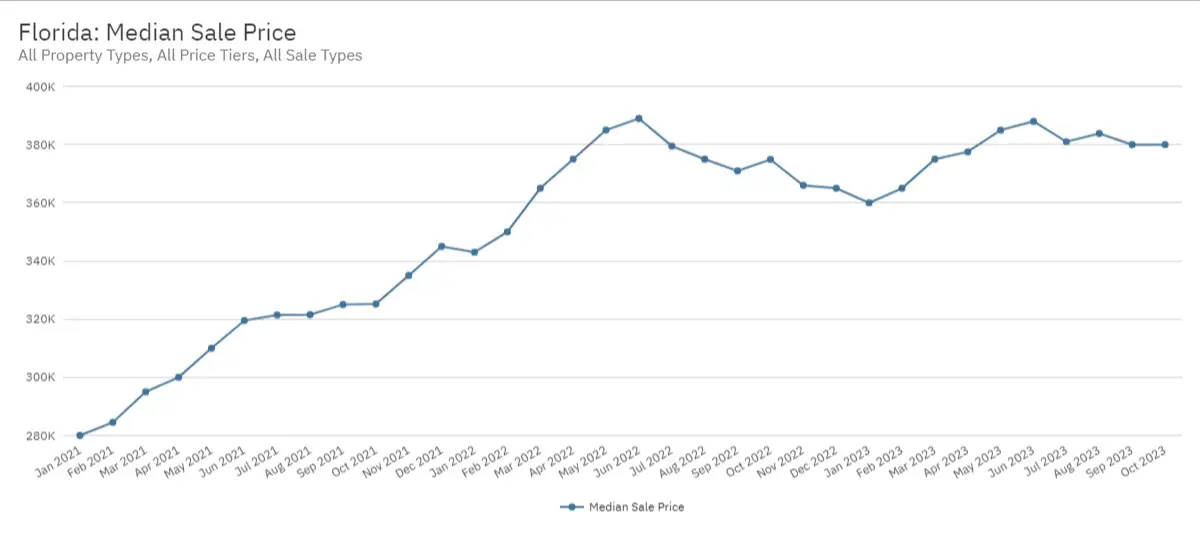
In recent times, the Florida housing market has displayed volatility, with the median sale prices fluctuating on a monthly basis. Observers cite a downturn, with drops as significant as 2.7% from one month to the next, hinting at an environment that raises questions about the viability of home flipping — a once booming industry across the state.
The act of purchasing, renovating, and selling houses for profit, known as flipping has been popularized by television and media, often presenting an attractive notion of quick financial gain. Florida, with its previously escalating property values, has been a hotbed for this activity. However, with the recent shifts in market dynamics, potential investors are questioning whether this practice can still yield profitable outcomes in 2024.
Despite potential downturns, there remain pockets within Florida that illustrate promise for the home flipping market. Specific cities are highlighted for their continued growth and investment potential, leading to a market that, while perhaps not as strong as in previous years, may still hold opportunities for those willing to navigate its complexities.
With informed strategies and thorough market research, flipping houses could remain a viable venture for diligent investors in select Floridian locales.

Evaluating the Viability of Home Flipping in Florida
The health of the home flipping market in Florida for 2024 hinges on an intricate balance of market trends, economic conditions, and regulatory frameworks. This examination focuses on the dynamic interplay of these factors to assess the state’s flipping prospects.
Current Market Conditions
Florida’s real estate market continues to draw investors, with home prices and market conditions being key drivers of flipping feasibility. In 2023, the state experienced a surge in population growth, which fueled demand and contributed to a competitive housing market. Investors must consider home prices that are expected to exhibit a steady increase into 2024, coupled with the current demand for housing, to gauge the potential for profit in house flipping ventures.
Florida Housing Market Predictions
Florida housing market predictions point to a sustained trend of growth influenced by ongoing population increases and a persistent desire for homeownership. Analysts, including chief economists, note that while the market is not expected to crash, the rate of growth might temper compared to the previous years. They suggest that strategic investments in well-located properties could still yield considerable returns.
Impact of Economic Factors
Economic factors such as interest rates and mortgage rates significantly affect the cost of borrowing and the return on investment for house flippers. The prediction of economists for 2024 indicates a cautious rise in interest rates, which may lead to a more selective market. Additionally, concerns over a potential recession could influence the investment strategy, shifting focus toward flips with shorter turnarounds to mitigate risk.
Legal and Regulatory Considerations
Legislative changes, building codes, and property taxes remain pivotal in assessing the viability of home flipping. Strict adherence to updated building codes can impact renovation costs, while property taxes must be factored into the holding costs during the flip. Investors should be well-versed with Florida’s regulatory climate to ensure compliance and avoid unforeseen expenses that can erode profits.

Regional Market Analysis
Analyzing the Florida housing market in 2024 reveals distinct regional variations, with certain areas offering more opportunities for home flippers than others due to differences in market dynamics and growth trends.
Hotspots for Flippers
- Tampa: With a competitive market that stems from robust population growth, Tampa continues to attract flippers. The median sale price allows for potential profits, but flippers must navigate the tight housing supply strategically.
- Miami: Despite higher property costs, Miami’s market remains appealing because of its consistent demand driven by both local and international buyers. The key for flippers here is finding undervalued properties that can be quickly renovated and sold.
Location-Specific Trends
- Cape Coral: Known for its affordable housing options, Cape Coral has been favorable for flippers. The market here has seen a steady rise in median sale price, offering a reasonable margin for profit.
- Port St. Lucie: This city is marked by its expanding population and affordable median sale prices, providing an advantageous environment for flipping activities, although buyers should closely monitor shifts in local demand and inventory levels.
Both sections illustrate unique characteristics of different Florida locales that impact flipping potential, from the competitive markets of bustling cities to the more accommodating conditions in up-and-coming areas. Flippers must consider factors such as location-specific demand, inventory levels, and the balance of median sale prices against expected returns when engaging with the Florida market in 2024.

Financial Aspects of Flipping
In the dynamic Florida real estate market, financial savviness is key when flipping houses. Investors should grasp the 70% rule, accurately calculate ROI and profit margins, and implement stringent cost management practices to sustain profitability in 2024.
Understanding the 70% Rule
The 70% rule is a cornerstone principle for house flippers which dictates that one should not pay more than 70% of the After-Repair Value (ARV) of a property minus the costs of renovations. This benchmark accounts for the purchase price, labor costs, and a buffer for unexpected expenses, thus aiming to ensure a solid profit margin upon sale.
- Example Calculation:
- ARV: $200,000
- Renovation Costs: $30,000
- Maximum Purchase Price: $200,000 x 70% – $30,000 = $110,000
Calculating ROI and Profit Margins
Return on Investment (ROI) is a measure of the efficiency and profitability of the investment, typically expressed as a percentage. For house flipping, ROI is calculated by subtracting the total costs (purchase, renovation, holding and closing costs) from the sale price, divided by the total costs.
Profit margins, on the other hand, highlight the actual earnings one keeps after all expenses. A high ROI and strong margins are indicative of a successful flip.
Cost Management
Effective cost management is critical in house flipping. Adequate budgeting for down payments, mortgage payments, closing costs, labor, and holding costs can make or break the investment. Meticulous investors maintain a network of reliable contractors and use bulk purchasing to keep renovation costs in check. They also plan for contingencies to prevent budget overruns that can erode profit margins.

Operational Challenges in Flipping
In the realm of house flipping in Florida in 2024, practical challenges can make or break the profitability of an investment. Flippers need to approach renovations, market fluctuations, and resource management with meticulous planning and expert knowledge.
Managing Renovations
Renovations serve as the cornerstone of flipping a single-family home. Labor costs associated with updating kitchen facilities, flooring and bathrooms can escalate if not forecasted properly. Also, a home’s roof, foundation, electrical systems, and HVAC must be assessed and possibly overhauled. Flippers frequently work with Angi and other service platforms to locate reliable contractors. Furthermore, unexpected issues revealed during the home inspection can significantly affect timelines and budgets.
Navigating the Real Estate Market
Understanding local market dynamics is crucial. In Florida’s competitive market, managing bidding wars and liaising with a real estate agent familiar with the market conditions is beneficial. Tools like Redfin and insights from Florida Realtors help navigate these waters. However, flippers must stay informed of market trends to avoid pitfalls like purchasing during a market peak or selling during a downturn.
Effective Use of Resources
Efficient resource management is imperative. This includes not only the construction materials but also short-term utility bills during renovation and funds from private money lenders or other financing options. Real estate professionals need to prioritize tasks that increase curb appeal and ensure a quick sale while keeping expenditure under control. Balancing high renovation standards with cost-efficiency is a delicate dance, and missteps can reduce the final profit.
By addressing these operational challenges with thorough planning and strategic execution, investors can remain competitive in the house flipping market in Florida for 2024.

Understanding Home Sales Dynamics
In 2024, Florida’s housing market reflects certain patterns within home sales, paired with inventory changes that influence house flipping prospects. This section dissects the inventory’s impact on market dynamics and the implications of sales trends.
Inventory and Listing Trends
Inventory levels in real estate signify the quantity of active listings on the market at a given time. A recovering housing market in 2024 notes expanding inventory, allowing for more choices for buyers and potentially less competition among sellers. This trend is critical for house flippers to assess when considering the availability of homes to purchase for renovation and resale.
- New Listings: The entry of new homes into the market directly affects inventory quantitatively.
- Active Listings: This metric provides insight into the current number of homes available, which dictates buyer options.
- Days on Market: Homes lingering longer on the market suggest a shift toward buyer advantage.
Sales Metrics and Market Health
Sales metrics provide a quantitative measure of home sales health and activity, which are essential indicators of market stability.
- Closed Sales: This figure denotes the number of real estate transactions successfully completed within a given timeframe.
- Sales Growth: A year-over-year increase signals a robust market appeal, while declines may suggest market contraction.
- Sales Volume: This metric, often discussed in dollar terms, can indicate the financial strength within the housing market.

Final Thoughts
In 2024, the landscape for flipping houses in Florida remains active but nuanced. Investors are advised to exercise due diligence in every real estate transaction to secure a favorable return on investment. While television shows have popularized the concept, the reality is more complex and grounded in market dynamics.
Key Considerations:
- Market Conditions: Investors must keep abreast of current market conditions, including any fluctuations in home prices, to time their investments wisely.
- Profit Margins: Profits from flipping houses are not guaranteed and depend on strategic purchasing and efficient renovations.
- Location Selection: Certain areas in Florida have demonstrated higher inbound move rates, indicating potential for flipping success.
Investment Strategies:
- Investors are encouraged to focus on acquiring properties at competitive prices.
- Renovations should balance cost-effectiveness with market demands to optimize resale value.
Challenges and Opportunities:
- The market is subject to changing economic factors, which can affect the costs of flipping and the potential buyer pool.
- Nonetheless, with a sizable portion of homes in Florida requiring renovations, there is opportunity for investors willing to provide these properties a second life.
In conclusion, flipping houses in Florida in 2024 can still be a profitable endeavor. Investors who stay informed and approach each project with a clear strategy have an opportunity to secure a profitable return on investment.
Buying or Selling?
Based on the most recent data, the current state of the residential market is changing fast. Whether you are a first-time buyer or a seasoned home seller, you can relying on our expertise and guidance when making one of the biggest financial decisions of your lives.
With more than 25 years in business and over 2,000 successful transactions, we have the knowledge and experience to produce results for our clients. We take a highly methodical and deliberate approach and have specific strategies to help get the best value during the transaction.

To learn more about how we help our clients, please visit our web site or contact us via email at info@quantumcos.com.

